新人教版选修7 Unit 2 Robots课件(48张ppt)
文档属性
| 名称 | 新人教版选修7 Unit 2 Robots课件(48张ppt) |
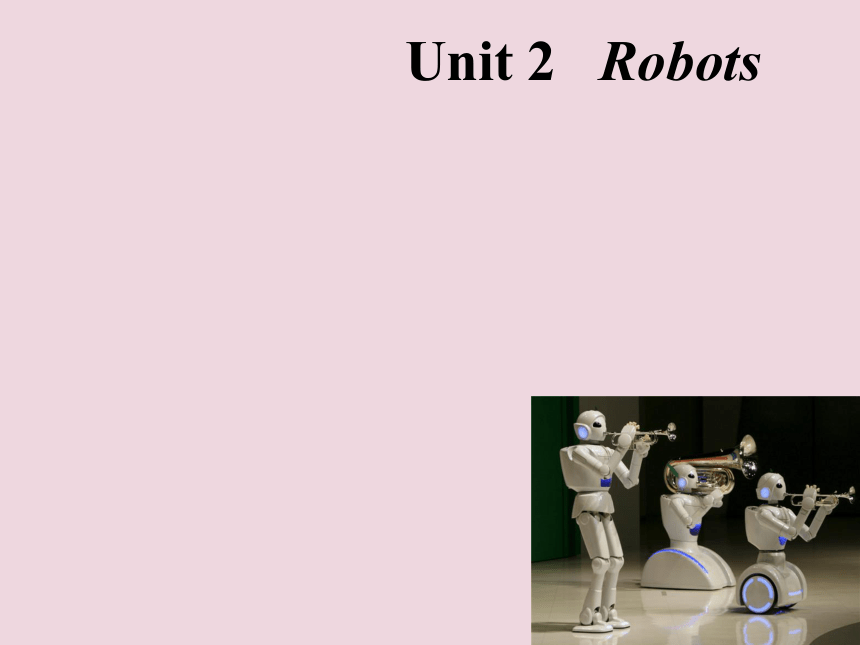
|
|
| 格式 | zip | ||
| 文件大小 | 747.0KB | ||
| 资源类型 | 教案 | ||
| 版本资源 | 人教版(新课程标准) | ||
| 科目 | 英语 | ||
| 更新时间 | 2019-08-25 00:00:00 | ||
图片预览

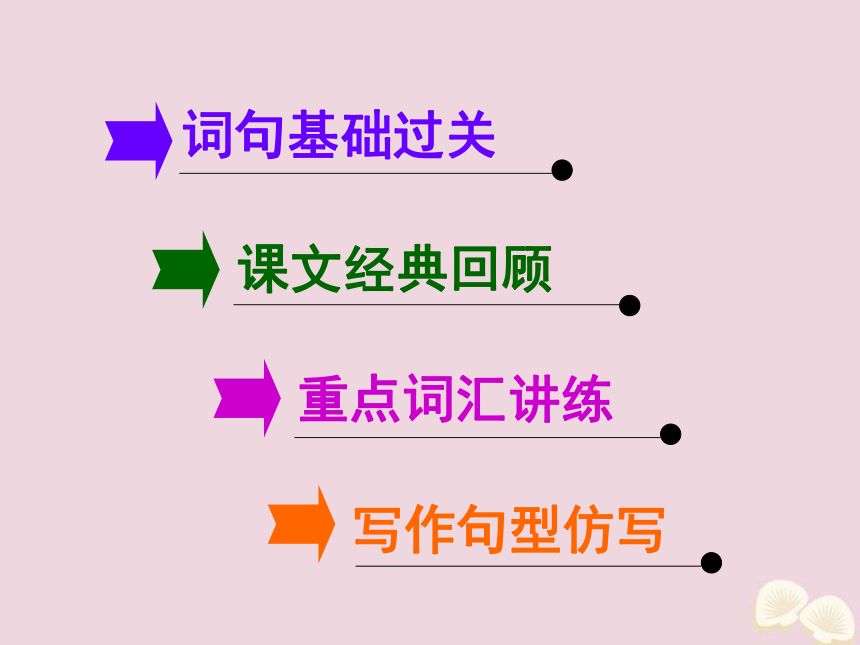

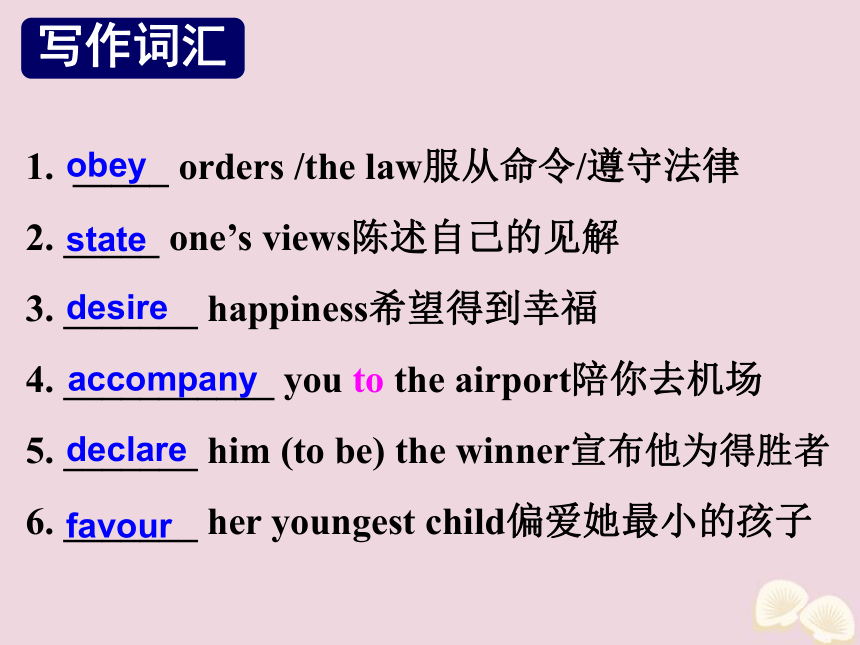
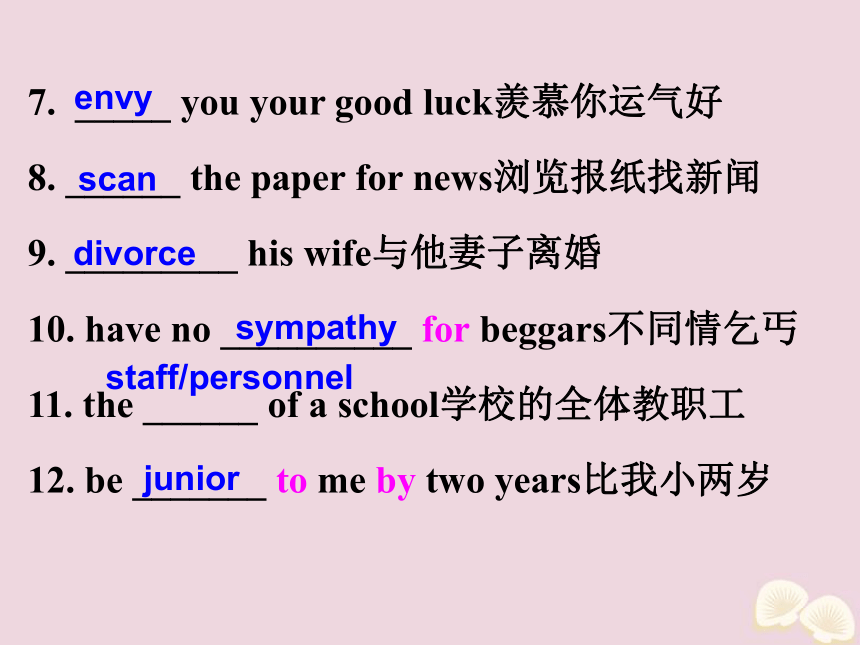
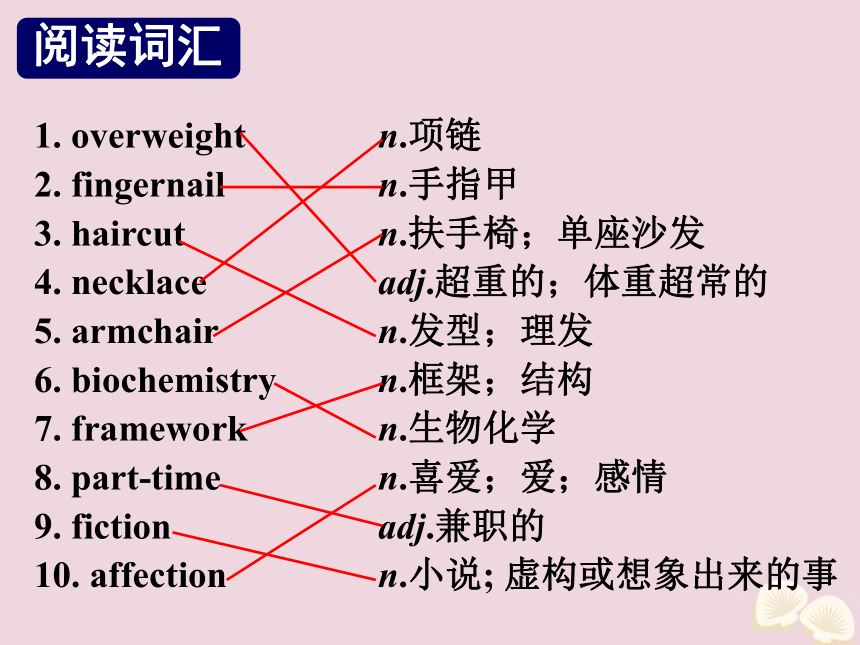
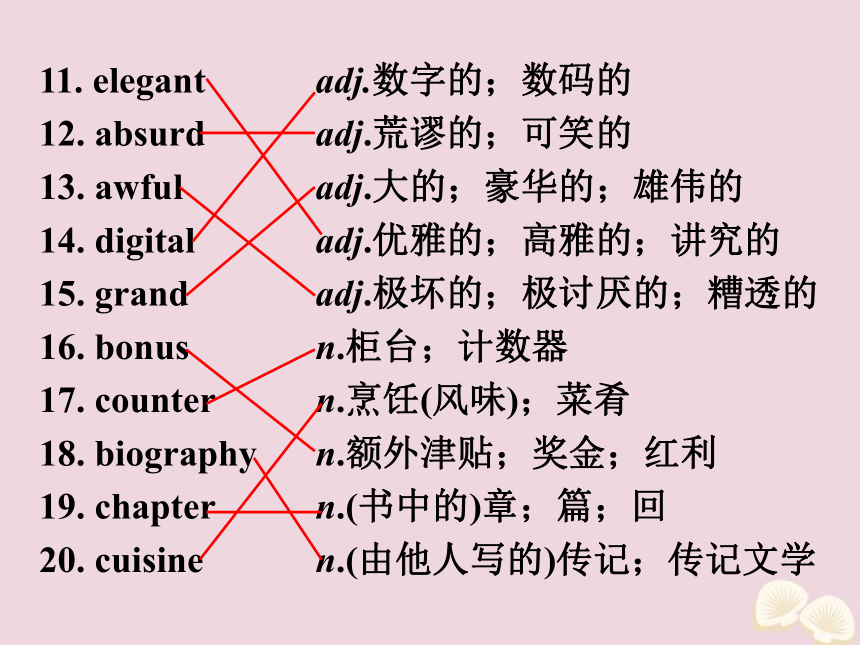
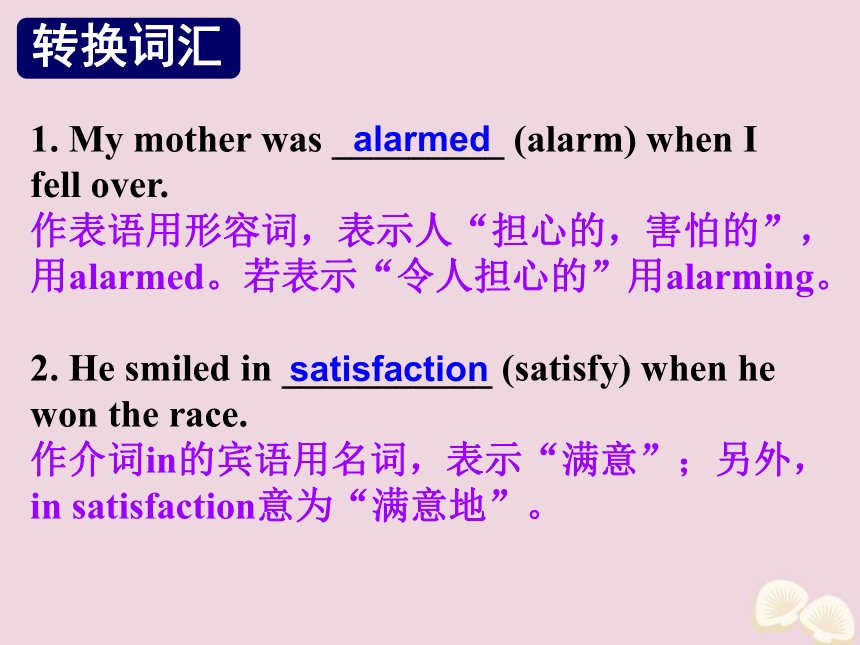
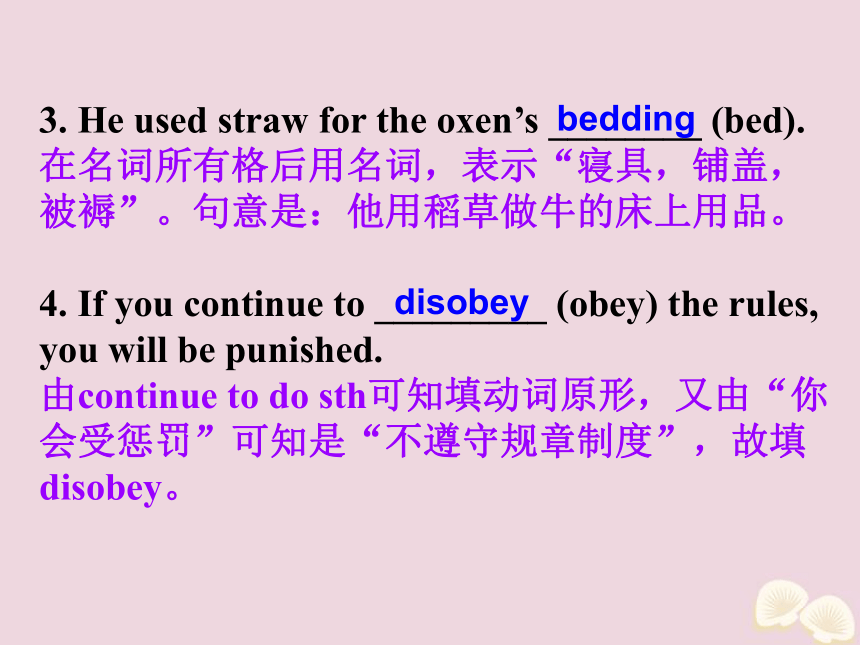
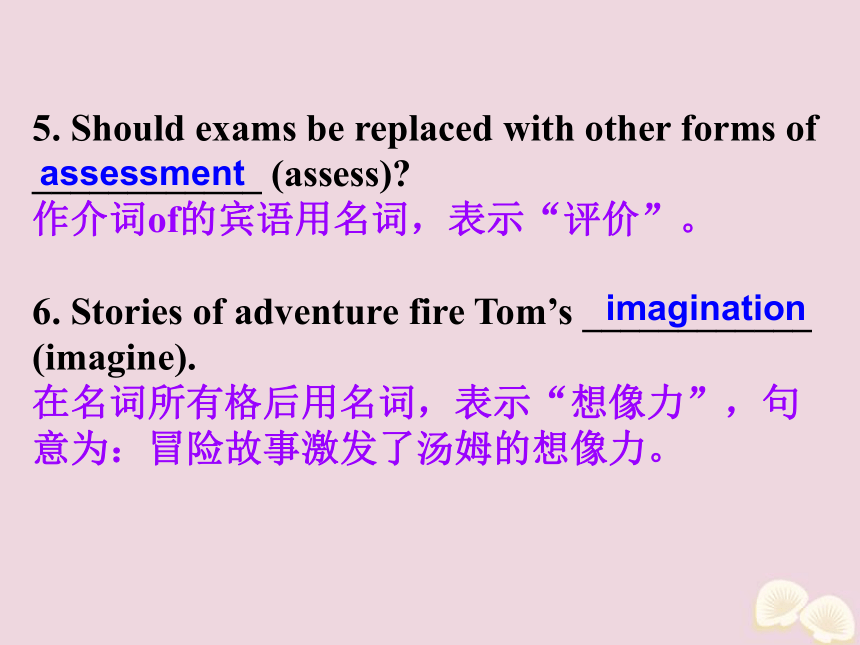
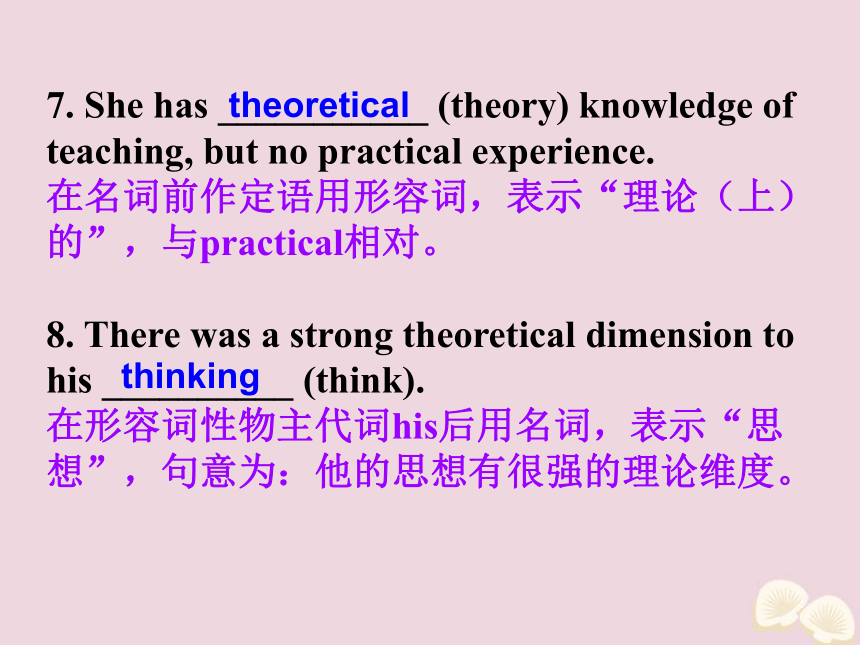
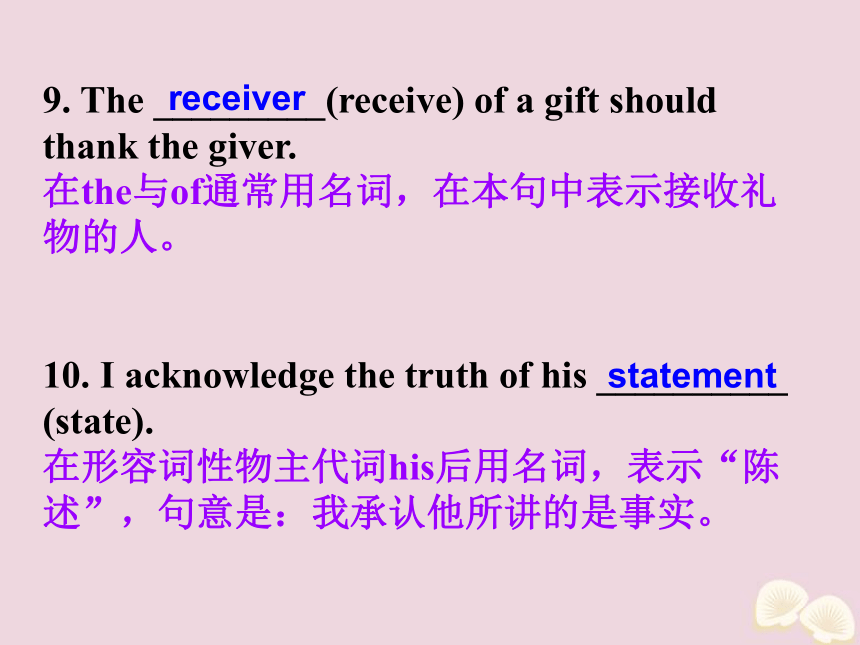
文档简介
(共48张PPT)
Unit 2 Robots
课文经典回顾
重点词汇讲练
写作句型仿写
词句基础过关
1. _____ orders /the law服从命令/遵守法律
2. _____ one’s views陈述自己的见解
3. _______ happiness希望得到幸福
4. ___________ you to the airport陪你去机场
5. _______ him (to be) the winner宣布他为得胜者
6. _______ her youngest child偏爱她最小的孩子
favour
obey
state
desire
accompany
declare
7. _____ you your good luck羡慕你运气好
8. ______ the paper for news浏览报纸找新闻
9. _________ his wife与他妻子离婚
10. have no __________ for beggars不同情乞丐
11. the ______ of a school学校的全体教职工
12. be _______ to me by two years比我小两岁
junior
envy
scan
divorce
sympathy
staff/personnel
1. overweight n.项链
2. fingernail n.手指甲
3. haircut n.扶手椅;单座沙发
4. necklace adj.超重的;体重超常的
5. armchair n.发型;理发
6. biochemistry n.框架;结构
7. framework n.生物化学
8. part-time n.喜爱;爱;感情
9. fiction adj.兼职的
10. affection n.小说; 虚构或想象出来的事
11. elegant adj.数字的;数码的
12. absurd adj.荒谬的;可笑的
13. awful adj.大的;豪华的;雄伟的
14. digital adj.优雅的;高雅的;讲究的
15. grand adj.极坏的;极讨厌的;糟透的
16. bonus n.柜台;计数器
17. counter n.烹饪(风味);菜肴
18. biography n.额外津贴;奖金;红利
19. chapter n.(书中的)章;篇;回
20. cuisine n.(由他人写的)传记;传记文学
1. My mother was _________ (alarm) when I
fell over.
作表语用形容词,表示人“担心的,害怕的”,用alarmed。若表示“令人担心的”用alarming。
2. He smiled in ___________ (satisfy) when he won the race.
作介词in的宾语用名词,表示“满意”;另外, in satisfaction意为“满意地”。
alarmed
satisfaction
3. He used straw for the oxen’s ________ (bed).
在名词所有格后用名词,表示“寝具,铺盖,被褥”。句意是:他用稻草做牛的床上用品。
4. If you continue to _________ (obey) the rules, you will be punished.
由continue to do sth可知填动词原形,又由“你会受惩罚”可知是“不遵守规章制度”,故填disobey。
bedding
disobey
5. Should exams be replaced with other forms of ____________ (assess)?
作介词of的宾语用名词,表示“评价”。
6. Stories of adventure fire Tom’s ____________ (imagine).
在名词所有格后用名词,表示“想像力”,句意为:冒险故事激发了汤姆的想像力。
assessment
imagination
7. She has ___________ (theory) knowledge of teaching, but no practical experience.
在名词前作定语用形容词,表示“理论(上)的”,与practical相对。
8. There was a strong theoretical dimension to his __________ (think).
在形容词性物主代词his后用名词,表示“思想”,句意为:他的思想有很强的理论维度。
theoretical
thinking
9. The _________(receive) of a gift should thank the giver.
在the与of通常用名词,在本句中表示接收礼物的人。
10. I acknowledge the truth of his __________ (state).
在形容词性物主代词his后用名词,表示“陈述”,句意是:我承认他所讲的是事实。
receiver
statement
1. _____________ 转向;回转
2. _________ his theories检验他的理论
3. _________ the clerk ____给那个职员打电话
4. __________ the books将那些书放在一边
set aside
turn around
test out
ring/call/phone
up
5. __________________ 让我一个人待着
6. _____________ pass the exam一定通过考试
7. have a talent _____ music有音乐天赋
8. thirteen people _____ all 一共13个人
in
leave/let me alone
be bound to/be certain/ sure to
for
1. His name was Tony and he seemed more like a human _______a machine.他的名字叫托尼,与其说他看上去像一台机器,倒不如说更像一个人。
than
2. As she turned around, there _______(stand) Gladys Claffern. 当她转过身去时, 她发现格拉
迪斯·克拉芬就站在身旁。
3. …you can not have women ________(fall) in love with machines. ……总不能让女人和机器
相爱吧。
stood
falling
4. It was when Asimov was eleven years old ______ his talent for writing became obvious. 早在阿西莫夫十一岁的时候,他的写作才华就已经显露出来了。
5. …Larry persuaded her that the robot wouldn’t harm her or allow her _____________ (harm). ……拉里把她说服:机器人不会伤害她,也不会让别人来伤害她。
to be harmed
that
Larry Belmont worked for a company that made robots. Recently it had begun experimenting with a household robot. It was going to be tested out by 1 _______ (Larry) wife, Claire.
Claire didn’t want 2 _____ robot in her house, especially as her husband would be absent 3____ three weeks, but Larry persuaded her that the robot wouldn’t harm her or allow her to be harmed. It would be a bonus.
Larry’s
the
for
However, when she first saw the robot, she felt
4 _________(alarm). His name was Tony and he seemed more like a human than a machine. He
5 _____(be) tall and handsome with smooth hair and a deep voice although his 6 _______ (face) expression never changed.
On the second morning Tony, 7 _________ (wear) an apron, brought her breakfast and then asked her 8 __________she needed help dressing. She 9 _____(feel) embarrassed and quickly told him 10 ______(go). It was disturbing and frightening that he looked so human.
to go
alarmed
was
facial
wearing
whether /if
felt
The night of the party arrived. The clock strikes eight. The guests would be arriving at
soon and Claire told Tony to go into another rooms. At that moment, Tony folded his arms
around her, bend his face close with hers.
She cried out “Tony” and then heard him declare that he didn’t want to leave her next
day and that he felt more than just the desire to please him. Then the front door bell rings.
Tony freed her and disappeared from sight.
It was then that Claire realized that Tony has
opened the curtains of the front window. Her guests had seen anything!
1. strikes→ struck 根据前文可知,用过去时。
2. 去掉arriving后面的at 因后面没有接地点。
3. rooms→ room 因another后面接可数名词单数。
4. bend→ bending 因Tony与bend是主动关系,用ing形式。
5. with→ to 表示“接近”是be close to。
6. 在next前加the 相对过去某天来说的第二天用the next day。
7. him→ her 根据前面的人称可知此处应该是满足“她”。
8. rings→ rang 因全文动词都用过去时。
9. has→ had 前面有过去时,故此处应用过去完成时。
10. anything→ everything 表示客人已经看到了一切。
desire sth 渴望得到某物
desire to do sth 希望/渴望做某事
desire that sb (should) do要求……
have a desire for sth /to do sth 渴望得到某物/做某事
1. desire n.渴望;渴求 vt. 希望得到;要求
⑴ 每个人都渴望成功,但并非人人都渴望金钱。
Everyone has a desire for success/Everyone desires success, but not everyone desires to get money.
⑵ 他要求你马上去见他。
He desires you to go to see him at once. = He desires that you should go to see him at once.
in alarm 惊慌地
an alarm clock 一个闹钟
give /raise /sound the alarm发警报
2. alarm n.警报;惊恐 vt. 使警觉; 使…惊恐
_________ adj. 惊人的; 令人担忧的
________ adj. 担心的; 害怕的(frightened)
alarmed
alarming
(1) She sat up _________ (惊慌地).
(2) I was still asleep when the fire
alarm _____________(火警铃响了).
(3) Neighbours ________________
(发出警报) when they smelled smoke.
raised the alarm
in alarm
went off/rang
feel/ have sympathy for sb 同情某人
in sympathy with 同情;赞成;支持
out of sympathy for 出于对……的同情
win sympathy of博得……的同情
3. sympathy n.同情
⑴ 听完这个故事,他对她目前的情况深感同情。
After hearing the story,___________________
___________________.
⑵ 通过描述他悲惨的童年,他赢得路人的同情。
________________________________by describing his miserable childhood.
he felt sympathy for
He won the sympathy of passers-by
her present situation
in favour of=in support of赞成;支持
do sb a favour给某人以恩惠;帮某人一个忙
favour A over B=prefer A to B喜欢A胜过B
4. favour n.喜爱;恩惠 vt. 喜爱;偏袒
favourite adj. 最喜欢的
n. 最喜欢的事物或人
⑴ Personally,I am not ____________ (赞成)having classes on weekends.
⑵ Could you please ________________ (帮
我) to take the luggage to the sixth floor?
⑶ It is wrong for some Chinese parents to ___________________ (重男轻女).
favour boys over girls
in favour of
do me the favour
declare that… 宣布/声明
declare for/against 声明赞成/反对
declare sb /sth (to be) adj./n.宣称……是
5. declare vt. 宣布;声明;表明;宣称
⑴ He declared ____________________
_____________________ (自己是无罪的).
⑵ 我们声明赞成他们的建议。
We declare for their proposal.
that he was innocent/
himself to be innocent
envy sb (sth) 妒忌/羡慕某人(某物)
the envy of sb 令某人嫉妒/羡慕的人或事物
out of envy出于嫉妒/羡慕
6. envy n. &vt. 羡慕;嫉妒
⑴ 我羡慕你的好运气。
I envy (you) your good fortune/ luck.
⑵ 他的新车成了所有朋友羡慕的对象。
His new car is_________________________.
⑶ 出于妒忌,他撒了谎。
He told a lie out of envy.
the envy of all his friends
turn away 把(脸)转过去
turn against 背叛;反抗
turn on/off 打开/关掉
turn up 出现/调大(音量)
turn down 拒绝;调小(音量)
turn out 结果是;证明是
7. turn around转向;转过身来
⑴ 当他朝旅馆走去时,突然转身发现一个老妇人跟着他。
As he walked towards the hotel, ___________
__________________________________
_____________.
⑵ 虽然贫穷,但是女孩毅然地拒绝了别人的帮助。
Though poor, __________________________
___________.
he suddenly
turned around and found an old lady
the girl turned down others’
following him
help firmly
leave behind 留下;遗留
leave aside (把某事)搁置一边
leave for 出发前往
leave out 省去;遗漏;不考虑
8. leave…alone别惹;让……一个人待着
⑴ 你本不该将Andy单独留在山上,因为那
非常危险。
_____________________________________
___________;it was very dangerous.
⑵ 老师要求我们将作文中不必要的词省去。
______________________________________
________________________________in our compositions.
You shouldn’t have left Andy alone in the
The teacher required us to/that we should
mountains
leave out some unnecessary words
set down写下;记下(=write down)
set off 开始动身(for a place)
set up 创立;建立;搭起
set out出发;着手做某事(to do sth)
set about doing着手做;开始做……
9. set aside将……放在一边;节省或保留
(时间、金钱)
⑴ 父亲放下报纸点了一支烟。
____________________________ and lit a cigarette.
⑵ 他努力工作省下钱供他儿子上大学。
He is working hard ______________________
_______________________.
to set aside some money
Father set aside the newspaper
for his son to go to college
除there外, here、now、then、in、out、away等副词放在句首时也用完全倒装。
1. there stands/ stood+主语(名词) ……站
在那里
⑴ Once upon a time,_____________________
_______(住着六个瞎子)in a small village in India.
⑵ ______________________________________
(学生们冲出教室)when the bell rang.
⑶ The door opened,and _________________ _______ (张教授进来了),followed by two of his assistants.
用倒装结构完成下列句子。
there lived six blind men/
in came Professor
people
Out of the classroom rushed the students
Zhang
⑴ She won’t __________________________
______(容许她的学生在课堂上睡觉).
⑵ In order to keep wild animals away,we
_______________________________(让火整夜燃着).
2. have sb doing sth 容许某人做某事(与won’t/
can’t连用);让……一直做……
have her students sleeping in
had the fire burning all night long
class
⑴ 所有的这些礼物必须及时邮寄,以便在
圣诞节及时收到。
All these gifts must be mailed immediately
____________________________________.
⑵ 此药得一日三次,饭后服用。
The medicine is required ________________
______________________.
3. to be done 被……(不定式的被动式)
so as to be received in time for Christmas
to be taken three
times a day after meals
Unit 2 Robots
课文经典回顾
重点词汇讲练
写作句型仿写
词句基础过关
1. _____ orders /the law服从命令/遵守法律
2. _____ one’s views陈述自己的见解
3. _______ happiness希望得到幸福
4. ___________ you to the airport陪你去机场
5. _______ him (to be) the winner宣布他为得胜者
6. _______ her youngest child偏爱她最小的孩子
favour
obey
state
desire
accompany
declare
7. _____ you your good luck羡慕你运气好
8. ______ the paper for news浏览报纸找新闻
9. _________ his wife与他妻子离婚
10. have no __________ for beggars不同情乞丐
11. the ______ of a school学校的全体教职工
12. be _______ to me by two years比我小两岁
junior
envy
scan
divorce
sympathy
staff/personnel
1. overweight n.项链
2. fingernail n.手指甲
3. haircut n.扶手椅;单座沙发
4. necklace adj.超重的;体重超常的
5. armchair n.发型;理发
6. biochemistry n.框架;结构
7. framework n.生物化学
8. part-time n.喜爱;爱;感情
9. fiction adj.兼职的
10. affection n.小说; 虚构或想象出来的事
11. elegant adj.数字的;数码的
12. absurd adj.荒谬的;可笑的
13. awful adj.大的;豪华的;雄伟的
14. digital adj.优雅的;高雅的;讲究的
15. grand adj.极坏的;极讨厌的;糟透的
16. bonus n.柜台;计数器
17. counter n.烹饪(风味);菜肴
18. biography n.额外津贴;奖金;红利
19. chapter n.(书中的)章;篇;回
20. cuisine n.(由他人写的)传记;传记文学
1. My mother was _________ (alarm) when I
fell over.
作表语用形容词,表示人“担心的,害怕的”,用alarmed。若表示“令人担心的”用alarming。
2. He smiled in ___________ (satisfy) when he won the race.
作介词in的宾语用名词,表示“满意”;另外, in satisfaction意为“满意地”。
alarmed
satisfaction
3. He used straw for the oxen’s ________ (bed).
在名词所有格后用名词,表示“寝具,铺盖,被褥”。句意是:他用稻草做牛的床上用品。
4. If you continue to _________ (obey) the rules, you will be punished.
由continue to do sth可知填动词原形,又由“你会受惩罚”可知是“不遵守规章制度”,故填disobey。
bedding
disobey
5. Should exams be replaced with other forms of ____________ (assess)?
作介词of的宾语用名词,表示“评价”。
6. Stories of adventure fire Tom’s ____________ (imagine).
在名词所有格后用名词,表示“想像力”,句意为:冒险故事激发了汤姆的想像力。
assessment
imagination
7. She has ___________ (theory) knowledge of teaching, but no practical experience.
在名词前作定语用形容词,表示“理论(上)的”,与practical相对。
8. There was a strong theoretical dimension to his __________ (think).
在形容词性物主代词his后用名词,表示“思想”,句意为:他的思想有很强的理论维度。
theoretical
thinking
9. The _________(receive) of a gift should thank the giver.
在the与of通常用名词,在本句中表示接收礼物的人。
10. I acknowledge the truth of his __________ (state).
在形容词性物主代词his后用名词,表示“陈述”,句意是:我承认他所讲的是事实。
receiver
statement
1. _____________ 转向;回转
2. _________ his theories检验他的理论
3. _________ the clerk ____给那个职员打电话
4. __________ the books将那些书放在一边
set aside
turn around
test out
ring/call/phone
up
5. __________________ 让我一个人待着
6. _____________ pass the exam一定通过考试
7. have a talent _____ music有音乐天赋
8. thirteen people _____ all 一共13个人
in
leave/let me alone
be bound to/be certain/ sure to
for
1. His name was Tony and he seemed more like a human _______a machine.他的名字叫托尼,与其说他看上去像一台机器,倒不如说更像一个人。
than
2. As she turned around, there _______(stand) Gladys Claffern. 当她转过身去时, 她发现格拉
迪斯·克拉芬就站在身旁。
3. …you can not have women ________(fall) in love with machines. ……总不能让女人和机器
相爱吧。
stood
falling
4. It was when Asimov was eleven years old ______ his talent for writing became obvious. 早在阿西莫夫十一岁的时候,他的写作才华就已经显露出来了。
5. …Larry persuaded her that the robot wouldn’t harm her or allow her _____________ (harm). ……拉里把她说服:机器人不会伤害她,也不会让别人来伤害她。
to be harmed
that
Larry Belmont worked for a company that made robots. Recently it had begun experimenting with a household robot. It was going to be tested out by 1 _______ (Larry) wife, Claire.
Claire didn’t want 2 _____ robot in her house, especially as her husband would be absent 3____ three weeks, but Larry persuaded her that the robot wouldn’t harm her or allow her to be harmed. It would be a bonus.
Larry’s
the
for
However, when she first saw the robot, she felt
4 _________(alarm). His name was Tony and he seemed more like a human than a machine. He
5 _____(be) tall and handsome with smooth hair and a deep voice although his 6 _______ (face) expression never changed.
On the second morning Tony, 7 _________ (wear) an apron, brought her breakfast and then asked her 8 __________she needed help dressing. She 9 _____(feel) embarrassed and quickly told him 10 ______(go). It was disturbing and frightening that he looked so human.
to go
alarmed
was
facial
wearing
whether /if
felt
The night of the party arrived. The clock strikes eight. The guests would be arriving at
soon and Claire told Tony to go into another rooms. At that moment, Tony folded his arms
around her, bend his face close with hers.
She cried out “Tony” and then heard him declare that he didn’t want to leave her next
day and that he felt more than just the desire to please him. Then the front door bell rings.
Tony freed her and disappeared from sight.
It was then that Claire realized that Tony has
opened the curtains of the front window. Her guests had seen anything!
1. strikes→ struck 根据前文可知,用过去时。
2. 去掉arriving后面的at 因后面没有接地点。
3. rooms→ room 因another后面接可数名词单数。
4. bend→ bending 因Tony与bend是主动关系,用ing形式。
5. with→ to 表示“接近”是be close to。
6. 在next前加the 相对过去某天来说的第二天用the next day。
7. him→ her 根据前面的人称可知此处应该是满足“她”。
8. rings→ rang 因全文动词都用过去时。
9. has→ had 前面有过去时,故此处应用过去完成时。
10. anything→ everything 表示客人已经看到了一切。
desire sth 渴望得到某物
desire to do sth 希望/渴望做某事
desire that sb (should) do要求……
have a desire for sth /to do sth 渴望得到某物/做某事
1. desire n.渴望;渴求 vt. 希望得到;要求
⑴ 每个人都渴望成功,但并非人人都渴望金钱。
Everyone has a desire for success/Everyone desires success, but not everyone desires to get money.
⑵ 他要求你马上去见他。
He desires you to go to see him at once. = He desires that you should go to see him at once.
in alarm 惊慌地
an alarm clock 一个闹钟
give /raise /sound the alarm发警报
2. alarm n.警报;惊恐 vt. 使警觉; 使…惊恐
_________ adj. 惊人的; 令人担忧的
________ adj. 担心的; 害怕的(frightened)
alarmed
alarming
(1) She sat up _________ (惊慌地).
(2) I was still asleep when the fire
alarm _____________(火警铃响了).
(3) Neighbours ________________
(发出警报) when they smelled smoke.
raised the alarm
in alarm
went off/rang
feel/ have sympathy for sb 同情某人
in sympathy with 同情;赞成;支持
out of sympathy for 出于对……的同情
win sympathy of博得……的同情
3. sympathy n.同情
⑴ 听完这个故事,他对她目前的情况深感同情。
After hearing the story,___________________
___________________.
⑵ 通过描述他悲惨的童年,他赢得路人的同情。
________________________________by describing his miserable childhood.
he felt sympathy for
He won the sympathy of passers-by
her present situation
in favour of=in support of赞成;支持
do sb a favour给某人以恩惠;帮某人一个忙
favour A over B=prefer A to B喜欢A胜过B
4. favour n.喜爱;恩惠 vt. 喜爱;偏袒
favourite adj. 最喜欢的
n. 最喜欢的事物或人
⑴ Personally,I am not ____________ (赞成)having classes on weekends.
⑵ Could you please ________________ (帮
我) to take the luggage to the sixth floor?
⑶ It is wrong for some Chinese parents to ___________________ (重男轻女).
favour boys over girls
in favour of
do me the favour
declare that… 宣布/声明
declare for/against 声明赞成/反对
declare sb /sth (to be) adj./n.宣称……是
5. declare vt. 宣布;声明;表明;宣称
⑴ He declared ____________________
_____________________ (自己是无罪的).
⑵ 我们声明赞成他们的建议。
We declare for their proposal.
that he was innocent/
himself to be innocent
envy sb (sth) 妒忌/羡慕某人(某物)
the envy of sb 令某人嫉妒/羡慕的人或事物
out of envy出于嫉妒/羡慕
6. envy n. &vt. 羡慕;嫉妒
⑴ 我羡慕你的好运气。
I envy (you) your good fortune/ luck.
⑵ 他的新车成了所有朋友羡慕的对象。
His new car is_________________________.
⑶ 出于妒忌,他撒了谎。
He told a lie out of envy.
the envy of all his friends
turn away 把(脸)转过去
turn against 背叛;反抗
turn on/off 打开/关掉
turn up 出现/调大(音量)
turn down 拒绝;调小(音量)
turn out 结果是;证明是
7. turn around转向;转过身来
⑴ 当他朝旅馆走去时,突然转身发现一个老妇人跟着他。
As he walked towards the hotel, ___________
__________________________________
_____________.
⑵ 虽然贫穷,但是女孩毅然地拒绝了别人的帮助。
Though poor, __________________________
___________.
he suddenly
turned around and found an old lady
the girl turned down others’
following him
help firmly
leave behind 留下;遗留
leave aside (把某事)搁置一边
leave for 出发前往
leave out 省去;遗漏;不考虑
8. leave…alone别惹;让……一个人待着
⑴ 你本不该将Andy单独留在山上,因为那
非常危险。
_____________________________________
___________;it was very dangerous.
⑵ 老师要求我们将作文中不必要的词省去。
______________________________________
________________________________in our compositions.
You shouldn’t have left Andy alone in the
The teacher required us to/that we should
mountains
leave out some unnecessary words
set down写下;记下(=write down)
set off 开始动身(for a place)
set up 创立;建立;搭起
set out出发;着手做某事(to do sth)
set about doing着手做;开始做……
9. set aside将……放在一边;节省或保留
(时间、金钱)
⑴ 父亲放下报纸点了一支烟。
____________________________ and lit a cigarette.
⑵ 他努力工作省下钱供他儿子上大学。
He is working hard ______________________
_______________________.
to set aside some money
Father set aside the newspaper
for his son to go to college
除there外, here、now、then、in、out、away等副词放在句首时也用完全倒装。
1. there stands/ stood+主语(名词) ……站
在那里
⑴ Once upon a time,_____________________
_______(住着六个瞎子)in a small village in India.
⑵ ______________________________________
(学生们冲出教室)when the bell rang.
⑶ The door opened,and _________________ _______ (张教授进来了),followed by two of his assistants.
用倒装结构完成下列句子。
there lived six blind men/
in came Professor
people
Out of the classroom rushed the students
Zhang
⑴ She won’t __________________________
______(容许她的学生在课堂上睡觉).
⑵ In order to keep wild animals away,we
_______________________________(让火整夜燃着).
2. have sb doing sth 容许某人做某事(与won’t/
can’t连用);让……一直做……
have her students sleeping in
had the fire burning all night long
class
⑴ 所有的这些礼物必须及时邮寄,以便在
圣诞节及时收到。
All these gifts must be mailed immediately
____________________________________.
⑵ 此药得一日三次,饭后服用。
The medicine is required ________________
______________________.
3. to be done 被……(不定式的被动式)
so as to be received in time for Christmas
to be taken three
times a day after meals
